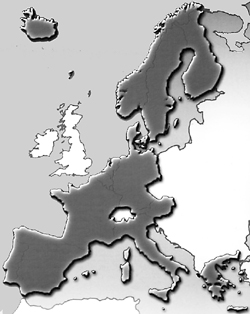(THIS ARTICLE IS MACHINE TRANSLATED by Google from Norwegian)
The inhabitants of the Nordic countries have been fooled by Schengen supporters.
On Sunday, the Schengen agreement comes into force. From then on, Norway is a member of Schengen and must comply with the rules laid down by the EU in this area.
The main reason the Labor Party and the other supporters of closer EU cooperation have used to get Norway into the Schengen cooperation is that it was the only opportunity to secure the Nordic passport union.
Ever since the first debate on Schengen emerged in the aftermath of the 1994 European elections, supporters have shown that this unique construction would save the Nordic passport union and in addition guarantee us passport freedom in the rest of Europe.
Schengen has been launched as an invention that should give us freedom. Freedom to travel around Europe without having to show a passport – just as we have been able to do in the Nordics for decades.
But what the supporters have not said is that we do not get rid of the passport. On the contrary, Schengen means that we must always carry a passport. We don't have to show the pass at Svinesund. But if we go to a hotel in Strømstad then we have to identify ourselves with a passport. It is true that the Schengen agreement requires all travelers to identify with nationality when they find a place to sleep when they are traveling. Hotels and campsites undertake to keep lists of travelers who have visited. The lists should be able to claim the police if they feel they need them.
Those who have struggled to contact other countries' embassies have received an answer that they must have a passport in the future. A ring round the Faroese newspaper Dimmalætting had to the Norwegian, Swedish and Finnish embassy in Copenhagen showed that they recommended everyone that Faroese citizens and other Nordic citizens bring their passports when they visit the other Nordic countries.
In large advertisements, SAS has recommended that passengers carry passports, even when flying to other Nordic countries.
In other words, the Nordic Passport Union becomes history in two days.
The most important argument for getting us into Schengen turns out to be deception. From Sunday, police in all Schengen countries must be able to stop anyone on the street and demand that they can document who they are. In principle, this control will only affect foreigners in a Schengen country. But how the police will be able to distinguish between people is unclear – if it is not the skin color that will decide.
And no reactions have been lacking either. Now they also come from non-Schengen countries. Earlier this week, Colombian Nobel laureate in literature Gabriel García Márquez sent a letter to Spanish Prime Minister Jose Maria Aznar. In the letter, Marquez makes it clear that he will not put his feet back on Spanish soil as long as Spain requires a visa.
Marquez believes that the new visa rules, which are a consequence of the Schengen acquis, are absurd and it is humiliating to have to show written permission to visit Spain. He is supported by other Spanish-speaking Colombian writers such as Fernando Vallejo, Alvaro Mutis, William Ospins, Dario Jarmillo and Hector Abad. The six authors have signed that they feel humiliated to have to apply for written permission to be able to visit Spain – the country they have never experienced as a foreigner.
But it is doubtful whether great authors reach the paragraph makers in Brussels. The last thing that has emerged from wonderful rules in the Schengen context is that, for example, the 300.000 foreign nationals living in Denmark have been given a duty to notify. For these, in the same way as for foreigners in Norway, if they are to visit another Schengen country, they must within 72 hours have reported to the local authorities that they are in the area. If they don't, they risk a ride on the smooth cell.
Director of the Norwegian Data Inspectorate, Georg Apenes, has stated quite precisely:
"It is clear that Schengen was not created to promote privacy in Europe."


